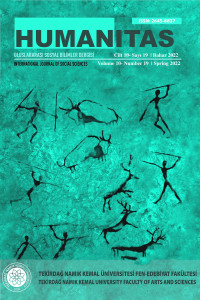Öz
Euripides’in Orestes tragedyasında halk meclisi büyük bir öneme sahiptir. Orestes’in meclisteki duruşması Orestes’in olay örgüsünün merkezinde yer alıp, tragedyayı bütünüyle şekillendirmektedir. Ancak meclisin Orestes’e niçin idam cezası verdiği oldukça ihtilaflıdır. Papadimitropoulos, Orestes’in suçlu bulunmasını tanrıların gazabından çekinen halkın kendi huzur ve refahını korumaya yönelik dini endişesine dayandırır. Ancak bu doğru olmadığı gibi, makul da değildir. Çünkü Argos halkı Orestes’i mevcut politik konjonktürün beklentisi doğrultusunda ve meclise de egemen olan yozlaşmış değerler üzerinden yargılamıştır. Bu makalede, Orestes’in meclis tarafından niçin suçlu bulunduğuna ilişkin bazı önemli filologların görüşleri ele alınacak ve Orestes’e verilen idam cezasının Tyndareos’un yozlaşmış halk meclisini etki altına alarak, çıkar amaçlı hareket eden halk tabakasını kötü yönlendirmesinden kaynaklandığı gösterilmeye çalışılacaktır.
Kaynakça
- Akıncı Öztürk, E. (2021). Athena’nın oyu ya da oyunu. Archivum Anatolicum, 15, 1-20.
- Burnett, A. P. (1971). Catastrophe survived: Euripides’ plays of mixed reversal. Oxford: Clarendon Press.
- Çokona, A. (2021). Euripidies, Orestes. (A. Çokona, Çev.). İstanbul: İş Bankası Kültür Yayınları. (Orijinal çalışma basım tarihi belirsiz).
- Fletcher, J. (2014). Polyphony to silence: the jurors of the Oresteia. College Literature, 41(2), 56-75.
- Greenberg, N. A. (1962). Euripides' Orestes: an interpretation. Harvard Studies in Classical Philology, 66, 157-192.
- Grube, G. M. A. (1941). The drama of Euripides. London: Methuen.
- Hester, D. A. (1981). The casting vote. The American Journal of Philology, 102(3), 265-274.
- Johnston, I. (2020). Euripides, Orestes. (I. Johnston, Çev.). Virginia: Richer Resources Publications. (Orijinal çalışma basım tarihi belirsiz).
- Latacz, J. (2016). Antik Yunan Tragedyaları. (Y. Onay, Çev.). İstanbul: Mitos-Boyut. (Orijinal çalışma basım tarihi 2003).
- Medda, E. (2014). Euripides: Orestes (Ὀρέστης). H. M. Roisman (Ed.), The Encyclopedia of Greek Tragedy içinde (s. 1-8). Oxford: Wiley-Blackwell.
- Papadimitropoulos, L. (2012). Orestes' conviction at the assembly in Euripides' Orestes. L'Antiquité Classique, 81, 1-11.
- Porter, J. R. (1994). Studies in Euripides’ Orestes. Leiden/New York/Köln: E. J. Brill.
- Vellacott, P. (1975). Ironic drama: a study of Euripides' method and meaning. Cambridge: Cambridge University Press.
- Verral, A. W. (1905). Essays on four plays of Euripides. Cambridge: Cambridge University Press.
- West, M. L. (1987). Euripides: Orestes. Warminster: Aris & Phillips Classical Texts.
- Willink, C. W. (1986). Euripides: Orestes. Oxford: Oxford University Press.
Öz
The assembly of the people of Argos has a key significance in Euripides’s Orestes. The trial of Orestes is at the center of Orestes’ plot and shapes the tragedy at full length. Yet the reason why Orestes is condemned to death by the assembly is rather controversial. For Papadimitropoulos, the reason of Orestes’ condemnation by the assembly is just the religious concern of the citizens to preserve the peace and the welfare of their city. But this is not true, nor is it plausible. This is because, the people of Argos judged Orestes on the basis of the amoral values prevailing in the assembly and in line with the expectation of the current political conjuncture. In this paper, I will discuss the views of certain scholars concerning the issue and argue that Orestes was sentenced to death because of Tyndareos’ misleading the benefit-oriented mob by influencing the corrupt ecclesia.
Kaynakça
- Akıncı Öztürk, E. (2021). Athena’nın oyu ya da oyunu. Archivum Anatolicum, 15, 1-20.
- Burnett, A. P. (1971). Catastrophe survived: Euripides’ plays of mixed reversal. Oxford: Clarendon Press.
- Çokona, A. (2021). Euripidies, Orestes. (A. Çokona, Çev.). İstanbul: İş Bankası Kültür Yayınları. (Orijinal çalışma basım tarihi belirsiz).
- Fletcher, J. (2014). Polyphony to silence: the jurors of the Oresteia. College Literature, 41(2), 56-75.
- Greenberg, N. A. (1962). Euripides' Orestes: an interpretation. Harvard Studies in Classical Philology, 66, 157-192.
- Grube, G. M. A. (1941). The drama of Euripides. London: Methuen.
- Hester, D. A. (1981). The casting vote. The American Journal of Philology, 102(3), 265-274.
- Johnston, I. (2020). Euripides, Orestes. (I. Johnston, Çev.). Virginia: Richer Resources Publications. (Orijinal çalışma basım tarihi belirsiz).
- Latacz, J. (2016). Antik Yunan Tragedyaları. (Y. Onay, Çev.). İstanbul: Mitos-Boyut. (Orijinal çalışma basım tarihi 2003).
- Medda, E. (2014). Euripides: Orestes (Ὀρέστης). H. M. Roisman (Ed.), The Encyclopedia of Greek Tragedy içinde (s. 1-8). Oxford: Wiley-Blackwell.
- Papadimitropoulos, L. (2012). Orestes' conviction at the assembly in Euripides' Orestes. L'Antiquité Classique, 81, 1-11.
- Porter, J. R. (1994). Studies in Euripides’ Orestes. Leiden/New York/Köln: E. J. Brill.
- Vellacott, P. (1975). Ironic drama: a study of Euripides' method and meaning. Cambridge: Cambridge University Press.
- Verral, A. W. (1905). Essays on four plays of Euripides. Cambridge: Cambridge University Press.
- West, M. L. (1987). Euripides: Orestes. Warminster: Aris & Phillips Classical Texts.
- Willink, C. W. (1986). Euripides: Orestes. Oxford: Oxford University Press.
Ayrıntılar
| Birincil Dil | Türkçe |
|---|---|
| Bölüm | Tüm Sayı |
| Yazarlar | |
| Yayımlanma Tarihi | 15 Mart 2022 |
| Yayımlandığı Sayı | Yıl 2022 Cilt: 10 Sayı: 19 |








